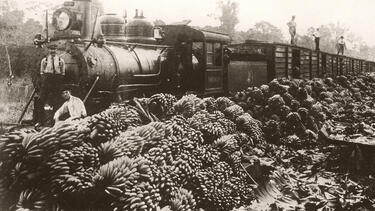Multinationals Can Have a Positive Local Impact—If They Face Enough Competition for Labor
In the 20th century, the United Fruit Company had a reputation for manipulating governments and exploiting workers in Latin America. But research co-authored by Yale SOM’s Diana Van Patten, examining the company’s presence in Costa Rica, found that in some areas, competition for workers led it to invest in local infrastructure, with long-lasting positive impacts.

Bananas being loaded onto the United Fruit Company's Northern Railway in Costa Rica, circa 1915.
In the 20th century, the political tactics of U.S.-based corporation United Fruit Company were infamous, which is why the company became most closely associated with the term (and the political arrangement) “banana republic.” The tropical fruit exporter achieved its long-running market dominance in part by securing tax breaks and land concessions from governments where it operated. By 1930, the company’s landholdings in Latin America totaled 3.5 million acres.
Diana Van Patten, an assistant professor of economics at Yale SOM, grew up in Costa Rica, one of the countries where UFCo operated. While the company had an abysmal reputation across Latin America, it was a more positive force in Costa Rica, where it made large-scale investments in local amenities.
In a new paper, co-authored with Esteban Méndez-Chacón of the Central Bank of Costa Rica, Van Patten shows that nearby labor competition and workers’ ability to move between jobs played a central role in shaping how positive the development impact of a firm like the United Fruit Company will be.
The researchers found that in the region in Costa Rica that they studied, the long-term economic impact of UFCo was, in fact, very positive—and though UFCo went bankrupt and ceased production in the region in 1984, its positive impact persisted. The benefits to households within the UFCo appeared to spring from the company’s investments in local amenities (like hospitals, schools, and roads) for workers and their families. The researchers found an important mechanism underpinning this relationship: in areas where workers had other, non-UFCo work opportunities nearby, the firm invested more in local amenities, which led to higher wellbeing for the UFCo workers living there.
In 1880, the Costa Rican government struck a deal with American contractor Minor C. Keith: in exchange for building a railroad, Keith received a concession of over 800,000 acres of undeveloped land, equivalent to 4% of the country’s territory. Keith began exporting the bananas he’d planted along the railroad tracks to feed workers and co-founded UFCo in 1899. The company would go on to also set up operations in Colombia, Cuba, the Dominican Republic, Ecuador, El Salvador, Guatemala, Honduras, Jamaica, Nicaragua, and Panama.
UFCo grew quickly in Costa Rica. By 1950, it employed about 7% of the country’s labor force. As its plantations grew larger, the company created camps on its property for farmers and their families. Within these camps UFCo eventually ran commissaries, schools, electric plants, sewage systems, hospitals, and recreational facilities.
The researchers’ first order of business was to examine the economic well-being of the people who lived within these UFCo-run communities over the long term. They obtained granular, restricted-access Census data for the years 1973, 1984, 2000, and 2011, allowing them to investigate the impact of UFCo during and for nearly three decades after the company’s tenure ended in 1984.
In 1973, eighty-four years after United Fruit Company received a land concession in Costa Rica, households living within the firm’s boundaries were 26% less likely to be poor than households outside.
Their analysis revealed that the households in the former UFCo region had higher living standards than nearby regions in terms of housing quality, sanitation, education, and consumption capacity. In 1973, eighty-four years after the company had received the land concession in Costa Rica, households living within the firm’s boundaries were 26% less likely to be poor than households outside. Even three decades after UFCo closed, the difference persisted: only 63% of the poverty gap had closed by 2011.
To better understand the reasons for the differences in living standards, the researchers culled through another dataset: shareholder reports from UFCo. In the reports, the researchers noticed that its leaders made direct references to the need to invest in amenities to attract workers. For example, after citing annual worker turnover of up to 100% per year, UFCo’s 1925 report recommends higher investment in facilities for married men and their families.
These investments were more likely to be made in places where UFCo’s employees had other work options nearby (most often, coffee harvesting). The researchers found that the intensity of UFCo’s investments in a given location was increasing in the degree of nearby labor competition; a 1% increase in outside options for workers in 1973, a location had a 0.73% lower probability of being poor in 2011.
The researchers also built a model to test how the firm’s impact would have changed in conditions with less worker mobility. The model revealed that if workers were half as mobile, the firm’s presence would have decreased overall welfare by 6%.
“The model offered a clear message that, with competition in the labor market, the company can have a positive welfare impact,” Van Patten says. “However, in another setting with lower labor mobility, it’s not necessarily a no-brainer to bring the company in, because it could decrease local welfare.”
What do the findings mean for governments considering admitting a multinational? Because of how dramatically the impacts of corporations are dependent on specific, on-the-ground conditions, Van Patten cautions that policymakers should not conclude from her findings that multinationals will always have a positive impact. And they should understand the importance of a competitive labor market, and the potential role of private companies as providers of local amenities.